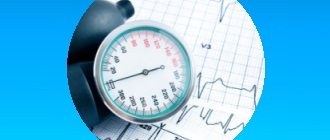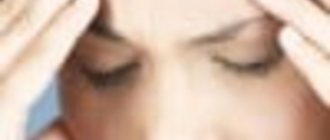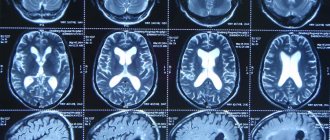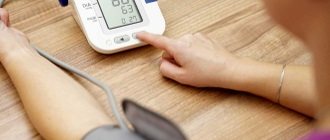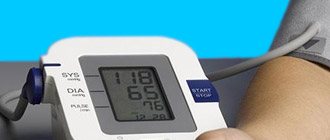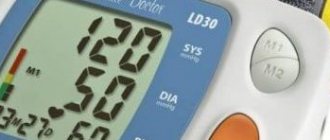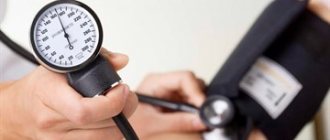During each contraction of the heart, a certain amount of blood is released into the large arteries. This happens under great pressure. The walls of peripheral vessels provide a certain resistance, which prevents the free movement of blood throughout the body. As a result, blood pressure is created in all vessels of the human circulatory system, or it is also called arterial pressure (BP).
The highest levels are recorded in the aorta, the lowest in the vena cava. The level of blood pressure depends on how much blood is pushed out by the myocardium during its contraction, as well as on the elasticity of the vascular walls. The upper pressure (systolic) depends on the amount of blood expelled, and the lower pressure (diastolic) depends on the elasticity of the vascular walls.
Normal values for the upper figure reach 140 mmHg. Art., but they should not fall below 100. If we talk about diastolic blood pressure, then these numbers are from 60 to 90. Blood pressure indicators are also affected by the general condition of the body and the presence of concomitant pathologies. Blood pressure levels are constantly changing. There is a certain relationship between the work of the myocardium, the volume of circulating blood, the lumen of blood vessels and the capacity of the vascular bed. This ratio is controlled by nervous and humoral regulation.
Also, the pressure numbers depend on how much blood returned to the heart through the veins, since the more the atrium and venous sinus stretch, the more powerful the contraction of the heart muscle follows. When recording their own blood pressure readings, people are interested in the question of whether the numbers are normal, especially if accompanying symptoms of pathology appear. The article will look at what a pressure of 110 over 70 means, whether it is considered normal, and, if not, what to do in this condition.
What is considered normal blood pressure in a person?
In most clinical pictures, a blood pressure reading of 120 per 80 mm is not suspicious. Hg Art. A decreased upper or lower indicator indicates progressive hypotension, however, before making a final diagnosis, the doctor studies specific numbers. A blood pressure of 110 over 70 is a functional norm, since deviations of 20 mm up or down are not taken into account if the clinical patient is in satisfactory health. Low upper blood pressure is a reason to contact a cardiologist for further examination.
Normal blood pressure by age
Blood pressure varies depending on a person's age. For example, a digit ratio of 95/65 is the norm for a one-year-old child and a global health problem for a hypotensive person over 45 years of age. If we talk about the younger generation, the limit from 100/70 to 120/80 mm is considered acceptable at 16-22 years old. Hg Art. As a person gets older, these numbers increase; for example, for the age category of 45 and older, the norm is 130/80, but not 110/70 mm. Hg Art. If a woman and a man feel healthy, there is no need to start drug treatment
Why does blood pressure decrease?
Minor, short-term fluctuations in blood pressure downward are not considered a pathology when they spontaneously normalize. Their cause may be lack of sleep, excessive mental or physical fatigue, or stress.
The reason for pressure fluctuations may be the time of day. Under the influence of various reasons, this indicator changes several times during the day. Therefore, doctors recommend monitoring blood pressure twice – in the morning and in the evening.
With numbers of 110 over 70 or similar values, hypotension is not diagnosed; it is characterized by numbers below 100/60.
The cause of a slight decrease may be many external and internal factors, including serious diseases. These include:
- overwork, stress;
- chronic lack of sleep;
- regular physical overexertion;
- smoking, alcohol;
- problems with the endocrine or nervous systems;
- hormonal disorders;
- tumors;
- head injuries;
- bleeding of various nature;
- inflammatory process with high fever;
- prolonged vomiting or diarrhea;
- mental disorders;
- severe infections (tuberculosis, HIV, syphilis);
- some heart pathologies.
Long-term use of certain medications (diuretics, antihypertensives) can also cause a persistent decrease in blood pressure.
Low upper pressure - causes
With prolonged symptoms of hypotension, the patient urgently needs to reliably determine the etiology of the pathological process, and then first eliminate the provoking factor, and then all its manifestations. A slight violation of blood pressure has the following causes, which are not difficult to diagnose in the laboratory:
- vegetative-vascular dystonia;
- hormonal imbalance, especially in women;
- superficial self-medication with medications;
- decreased blood viscosity, narrowing of the aorta;
- therapeutic and cosmetic sessions that provoke vasodilation;
- chronic diseases of the heart, hematopoietic organs (arrhythmia);
- viral diseases, including influenza;
- depression, asthenic syndrome, severe stress;
- internal bleeding;
- peptic ulcer;
- hypotension in pregnant women;
- extensive damage to the duodenum.
Consequences and prognosis
Against the background of a constant decrease in blood pressure, the organs and tissues of the body do not receive the oxygen they need in full. In this case, the brain cells suffer the most. Hypoxia (oxygen starvation) causes the development of cognitive disorders: a person’s memory decreases, concentration and coordination are impaired. In old age, senile dementia develops.
Complications of hypotension may include:
- injuries sustained after fainting;
- visual impairment;
- heart, kidney failure;
- ischemic stroke;
- neurological pathologies;
- depressive states.
Predicting the outcome of the disease is quite difficult. It all depends on the effectiveness of blood pressure level correction.
Primary hypotension is difficult to treat. Blood pressure can be normalized in approximately 70% of all diagnosed cases. But this condition does not pose a particular threat to human life. A decrease in pressure to the level of 90/60 can occur for various reasons. And if the condition is accompanied by poor health, then the person needs to consult a doctor.
Symptoms of low blood pressure
There are several options for the development of clinical pictures, but more often a greater number of attacks occur in the evening, at the end of a busy working day. The patient complains of dizziness, but this does not mean that there is a hypotensive crisis. We can talk about a disease if at least 3-4 signs presented in the list below are monitored in one clinical picture:
- noise in ears;
- increased frequency of fainting;
- discomfort in a stuffy room;
- slow pulse;
- lack of appetite;
- sharp deterioration in general health;
- weakness, increased drowsiness;
- decrease in body temperature;
- darkening and spots in the eyes;
- bouts of vomiting;
- restless sleep;
- pale skin;
- impaired coordination of movements;
- decreased intellectual activity;
- exacerbation of chronic heart disease.
This is an unpleasant condition, the opposite of the symptoms of hypertension, which can be cured with medications after a thorough clinical examination and a competent medical approach. Some patients prefer to drink a few cups of strong coffee to normalize their condition, but this is only a visible elimination of unpleasant symptoms - the problem lies deeper. It needs to be addressed urgently.
Headache with low blood pressure
As migraine attacks become more frequent, the patient begins to feel nauseous. Removing this unpleasant condition in the shortest possible time is very problematic. In addition to strong coffee, it is recommended to spend more time in the fresh air, breathe oxygen, and take long-distance walks. The general condition is normalized if you intensively rub your palms and nose. This pressure massage has tonic and invigorating properties and “revives” the body. Additionally, you need to put a warm heating pad on your chest, head and neck, and drink hot tea. The following medications are recommended for migraines:
- Pentalgin, Citramon, Askofen;
- Gutron and other alpha-agonists;
- Bellataminal;
- tinctures of enterococcus and ginseng.
Nausea with low blood pressure
With a pathological decrease in blood pressure, nausea and dizziness are often present. There is no need to rush into taking the pills; the patient is advised to take a horizontal position, ensure peace and fall asleep. It is possible that after awakening, the general condition normalizes, and some of the unpleasant symptoms remain in the past.
If the desired effect is not observed, it is necessary to resort to drug therapy - take Dopamine Solvay, Caffetamine, Ditamine tablets, according to the prescribed doses of the attending physician. In complicated clinical situations, the following medications are antiemetic: Ondansetron, Metoclopramide, Domperidone. Superficial self-medication when choosing medications is strictly contraindicated.
When is the value 110/70 pathological?
The main indicator of normal blood pressure is excellent health, absence of discomfort. You should consult a doctor when, with the indicated tonometry figures, the condition is accompanied by the following unpleasant symptoms:
- throbbing pain in the temples;
- weakness, apathy;
- desire to sleep;
- noise in ears;
- visual impairment;
- pale face;
- cold sweat;
- confusion.
All of them are clear signs of hypotension, which, along with hypertension, is a serious disease that is subject to mandatory compensation. Even if the disease has not yet manifested itself with the indicated symptoms, you should be wary when the following signs appear:
- Meteor dependence. It is the change in weather that often causes changes in blood pressure.
- Feeling of constant fatigue even when there is no physical activity.
- Depression, depression for no apparent reason.
- Deterioration in sleep quality (insomnia or drowsiness).
- Deterioration of memory and concentration.
If you discover these symptoms, you should see a doctor.
Why is low blood pressure dangerous?
If the normal limit is exceeded, the patient is at risk of potential hypotension. The functioning of the cardiovascular system may be disrupted, the pulse slows down significantly, and the risk of developing dangerous diseases not only of the myocardium increases. Among the possible complications of low blood pressure, it is necessary to highlight the following pathologies:
- arterial hypertension;
- chronic hypotension;
- pathologies of the kidneys, myocardium;
- fetal hypoxia, pathological childbirth - in pregnant women;
- injuries and falls.
- Cabbage pie is quick and easy
- How to cast on stitches on knitting needles for beginners
- Myasthenia - what is it? Forms and causes of occurrence, symptoms and treatment of myasthenic syndrome
When is 110/70 normal?
Such tonometer numbers are a fairly common indicator and are in no way related to pathology. There are a lot of people for whom this level is comfortable and ideal.
Moreover, we are talking specifically about healthy people. These include:
- Teenagers. The blood pressure of a growing organism is prone to some fluctuation. During puberty (12-16 years), it is especially close to 110/70.
- Young women. Girls under 25 years old have indicators slightly above the lower normal limit.
- Persons of asthenic type. If you have a thin, toned physique, this is the most common level of pressure.
- Athletes. The decrease in performance is due to their long years of training with significant physical effort.
- Pregnant women. For women in the first trimester, a slight decrease in blood pressure of up to 10-15 points is typical. This is explained by the onset of hormonal changes.
In addition, many people live their entire lives with exactly these values, due to the characteristics of the cardiovascular system.
For older people, a reading of 110/70 is low and may be uncomfortable. As a rule, this level indicates poor blood circulation, which causes oxygen starvation of internal organs and the brain. The exceptions are persons of thin build, short stature, or former athletes.
In children of the first year of life, such values are a warning sign. It is significantly higher than normal, which may indicate the development of hypertension.
What to do if the pressure is 110 over 70
If there is a high risk of developing hypotension, immediate action is required. It is better to choose physiotherapeutic procedures than to take pills. Conservative treatment is indicated for severe symptoms and complicated clinical pictures. The disease is managed by a cardiologist, but the approach to successful treatment is still complex. It is important to diagnose not only the functioning of the heart, but also the kidneys, for which the upper blood pressure indicator is responsible.
During pregnancy
If the pressure is disturbed during pregnancy, the woman is recommended to have healthy sleep, good nutrition, take vitamins, walks in the fresh air and physiotherapeutic procedures in the form of inhaling portions of oxygen. Otherwise, labor may begin prematurely, and the newborn will develop a dangerous disease called hypoxia. Taking pills to increase blood pressure as a last resort, and drinking strong coffee is generally not recommended.
In older people
Since a person of retirement age already has a number of chronic diagnoses, it is important to prescribe medications for low blood pressure with extreme caution and not to forget about drug interactions. It is possible that a sharp drop in blood pressure is only a symptom of the underlying disease, so it is necessary to undergo a full examination and reliably identify the root cause.
What does it mean?
Many people are tormented by the question: is a blood pressure of 110/70 considered normal or does it indicate hypotension and is it time to rush to the hospital?
For expectant mothers
A woman's body undergoes temporary restructuring during pregnancy and changes in blood pressure are very common. According to doctors, blood pressure of 110/70 should not make pregnant women worry about their health and the health of their unborn child. Indicators that fall below 110/70 or jump above 140/90 should cause concern. Such sudden changes are hypotension or hypertension.
Blood pressure should be monitored at every visit to the antenatal clinic.
In adults and elderly
Most people consider a blood pressure reading of 110/70 to be low, but this opinion is erroneous and has no medical basis. This indicator is within the functional norm, so if a person feels well and does not have any diseases, then there is no need to worry about his condition.
However, if the usual indicators have always been slightly higher and suddenly dropped to 110/70, you need to look for the reason for such changes.
The normal value for people over 60 years of age is 135/90. Older people very often suffer from hypertension, so if your blood pressure suddenly drops to 110/70, you need to be concerned about your health and consult a doctor.
In children and adolescents
When a baby is born, his blood pressure “rises” with him. The normal value for a newborn baby is 80/50 mmHg. Art. The older the child gets, the higher the numbers. Therefore, the value of 110/70 in children should not worry parents, since it is within the normal range.
The same goes for teenagers. Their ideal blood pressure ranges range from 110–136/70–86 mmHg. Art.
How to treat low blood pressure
The first step is to eliminate all bad habits from your daily life, including the tendency to obesity. In addition, it is necessary to individually adjust the daily menu and completely exclude unhealthy dishes from it. You will also have to flatly refuse intense physical activity, while promptly treating chronic insomnia or the preconditions for it. Walking in the fresh air should generally become the norm of everyday life. If all else fails, you will have to act radically.
What medications to take for low blood pressure
Even doctors recommend drinking a cup of coffee to make your heart beat faster and your pulse to return to normal. If you don’t like caffeine, you can make strong tea and observe changes in your general condition. If the effect is weak or mediocre, it is recommended to pay special attention to the purchase and further use of the following medications:
- Caffeamine. The tablets eliminate weakness and dizziness, but are contraindicated during pregnancy.
- Ditamin. The drug quickly normalizes blood pressure, but it is not recommended for chronic myocardial diseases.
- Metoclopamide. The tablets relieve weakness and dizziness; if you are prone to internal bleeding, they are contraindicated.
- Ondansetron. The medication not only eliminates the symptoms, but also treats the root cause. These tablets are not prescribed to pregnant and lactating women.
- Domperidone. This prescription is appropriate for postoperative hypotension, but not in the case of intestinal obstruction.
Folk remedies
If there is no desire to take pills, or the patient is afraid of side effects, you can resort to alternative medicine. For example, you need to grind 4 fresh lemons into a meat grinder, pour in 1 liter of boiling water, cover tightly with a lid and leave. Store the composition in the refrigerator, consume before each meal, adding a teaspoon of honey. The recommended course of treatment is selected individually for systematic attacks of low blood pressure. If this condition is random (not systematic attacks), it is better to always have lemon and honey in reserve.
Physiotherapy for blood pressure
In order not to regularly take pills with a pressure of 110 to 70, it is advisable to undergo special course procedures in a day hospital. The attending physician prescribes such healing and invigorating sessions, and he also determines their number, features and duration:
- cold and hot shower;
- decimeter wave therapy;
- electrophoresis with anesthetics, calcium chloride solution;
- ultraviolet irradiation;
- balneotherapy.
Treatment
What to do if you have low blood pressure? To eliminate the unpleasant symptoms of the condition, it is necessary to raise blood pressure. If the pressure has dropped, then to normalize the condition, it is recommended to drink a cup of hot coffee or strong brewed tea. But doctors do not advise using stimulants too often, since the development of addiction is possible.
There are a number of recommendations that will help increase blood pressure. The tips are as follows:
Causes of low blood pressure with high heart rate
- You need to get out of bed slowly in the morning. First, you need to lie down for a while, wake up completely, and only then get up. This will prevent the development of dizziness, nausea and fainting.
- You should always drink at least two liters of fluid during the day.
- Meals should be fractional. Food should be taken at least 4 times a day. At the same time, the diet must fully satisfy all the body’s needs for nutrients (proteins, fats, carbohydrates) and essential vitamins and microelements.
- It is advisable to exclude fried, fatty foods, smoked foods, and spices from the menu.
- Water procedures give good results. Hydromassage and contrast showers are beneficial (but you should avoid sudden temperature changes).
- Age-appropriate physical activity. Static loads are not suitable for hypotensive patients. You should give preference to swimming, tennis, volleyball.
When treating mild forms of hypotension—pressure readings of 90/60 indicate this—specific medications are used in rare cases. Medicines containing caffeine may be prescribed: Pentalgin, Citramon and others.
As a rule, doctors advise using alcoholic herbal tinctures. Most often prescribed:
- Aralia Manchurian. Take 30 drops three times a day.
- Ginseng, Eleutherococcus. The drugs have a tonic effect and improve myocardial function. Course duration – 2 weeks. Dosage regimen: 20 drops three times a day.
Emergency help
If the pressure drops too sharply, it can be stabilized using the following methods:
- Strongly brewed sweet hot tea. The drink helps eliminate headaches, warms and speeds up blood flow. This combination increases blood pressure.
- Strong coffee. A rapid increase in blood pressure occurs due to the presence of a large amount of caffeine in the drink. But the drink provides a short-term, short-lived effect.
- Bitter chocolate. A few pieces of sweet tea help improve vascular tone and normalize your overall well-being.
